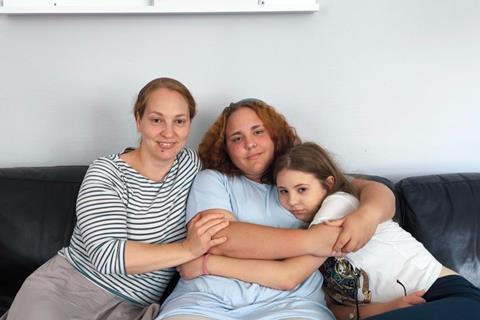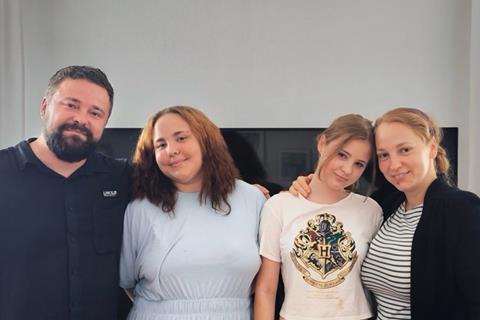After their eldest daughter made a false report at school when they refused her request for a phone and makeup, Christian couple Daniel and Bianca Samson were accused of “religious extremism” and had both daughters seized by the Swedish authorities. However shocking, ADF’s Guillermo Sancho says such a case is not an anomaly across Europe

It began with a simple dispute over a phone and some makeup with their daughter. Daniel and Bianca Samson never imagined that this would lead Swedish authorities to take their two daughters away from them.
After a disagreement with her parents over their views on mobile phones and make up, Sara, the eldest, made an accusation against them at school. This led to child protection services getting involved. Three years later, absent any evidence of abuse, their daughters are still separated from them and from each other.
This case strikes at the heart of every parent’s most fundamental right — the freedom to care for and protect one’s children. The Samsons, supported by legal advocacy organisation ADF International, have now taken their case before the European Court of Human Rights (ECtHR). Their plea to the court is to uphold their right to family life and religious freedom, clearly enshrined under Articles 8 and 9 of the European Convention on Human Rights.
Any parent’s nightmare
Sara retracted her false claim against her parents within days. Prosecutors investigated and cleared the parents of wrongdoing and even certified their “parenting aptitude”. Yet the girls — Sara and Tiana — were not returned home. Instead, Sweden’s child protection services pivoted and accused the Samsons of being “religious extremists.”

Their supposed extremism? Attending church three times a week, praying as a family, and setting faith-based boundaries for their children.
For nearly three years now, Daniel and Bianca have been allowed only one supervised visit per month with their daughters. The girls are kept in separate foster homes, far from each other and from their parents. Both have suffered deep physical and emotional decline — the parents have shared that both girls have attempted suicide.
This is unfortunately unsurprising. According to Sweden’s most robust study on the causal effects of child removal, the analysis of 21,597 child protection court files from 2001 to 2019 posited, “court-ordered removal strongly increases the risk of death […]. This effect is primarily driven by suicides that occur while the removed children are still placed in out-of-home care. Critical points in time are the summer months and the transition to adulthood.”
It is hard to imagine a more heartbreaking situation: children yearning to come home, parents cleared of wrongdoing, and yet state authorities refusing to reunite the family.
Despite a full investigation that found no abuse, Swedish authorities have prolonged the separation and ignored the best interests of the children. When every domestic remedy failed, the Samsons are placing their hope for reunification in Europe’s highest court. .
Faith on trial
The element of religious discrimination in this case is impossible to overlook. The state’s own lawyers described the couple’s regular church attendance and moral parenting — normal and regular practices — as evidence of extremism.
But since when did living according to one’s faith become a crime? The Samsons’ decisions — to limit phone use, to guide their daughters toward modesty, to raise them in the Christian faith — are all protected expressions of belief. They reflect not extremism, but conviction.
If parents can be punished for living out their Christian faith, what message does that send to believers across Europe? That faith must be confined to private thoughts — that prayer and worship should stay behind closed doors, cautious not to exceed the state’s prescribed limits?
ADF International is committed to ensuring that no one is punished for peacefully living out their beliefs. The Samsons’ ordeal shows how far even a democratic society can drift when faith is met with the state’s hostility.
This case is not an isolated tragedy. Across Europe, families have suffered under overreaching child-protection systems that too often substitute state judgment for parental care. The ECtHR has already condemned several states — including Norway, Spain, and the Netherlands — for violating the right to family unity.
In Strand Lobben v. Norway (2019) and Van Slooten v. the Netherlands (2025), the Court warned that governments must not turn temporary removals into permanent separations. Yet harrowing stories continue to emerge — children kept from loving parents, just because officials disapprove of their values.
The Samsons’ experience highlights a growing cultural fault line in Europe: the clash between secular ideology and faith-based family life. When Christian parents are labeled “dangerous” for guiding their children in accordance with scripture, the very foundation of religious freedom begins to crack.
A call to vigilance and prayer
Daniel and Bianca Samson are not fighting only for their daughters. They are fighting for every Christian parent’s right to raise children in faith without fear of losing them to the state. Their courage — and their suffering — should stir all of us to vigilance. Religious freedom cannot be taken for granted, even in the nations that once championed it.
As this case unfolds, believers across Europe should pray for justice, for reunification, and for renewed respect for the family as the cornerstone of society. The home is where parents nurture faith, love, and moral conviction in their children. Parents must be free to raise their children in accordance with their convictions.
If that freedom is lost, so too is the heart of what it means to live as people of faith.



































No comments yet